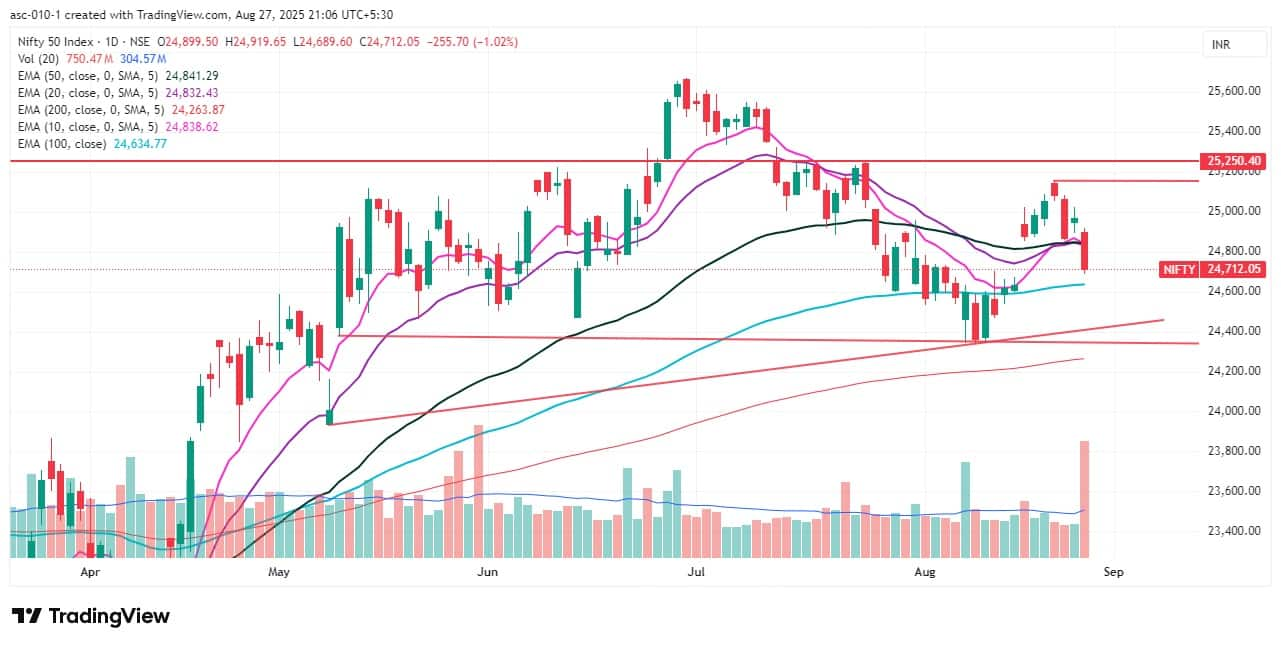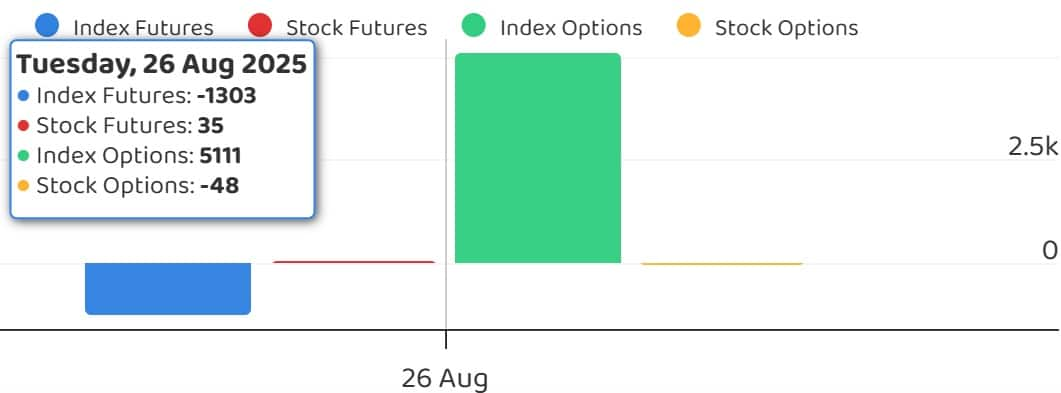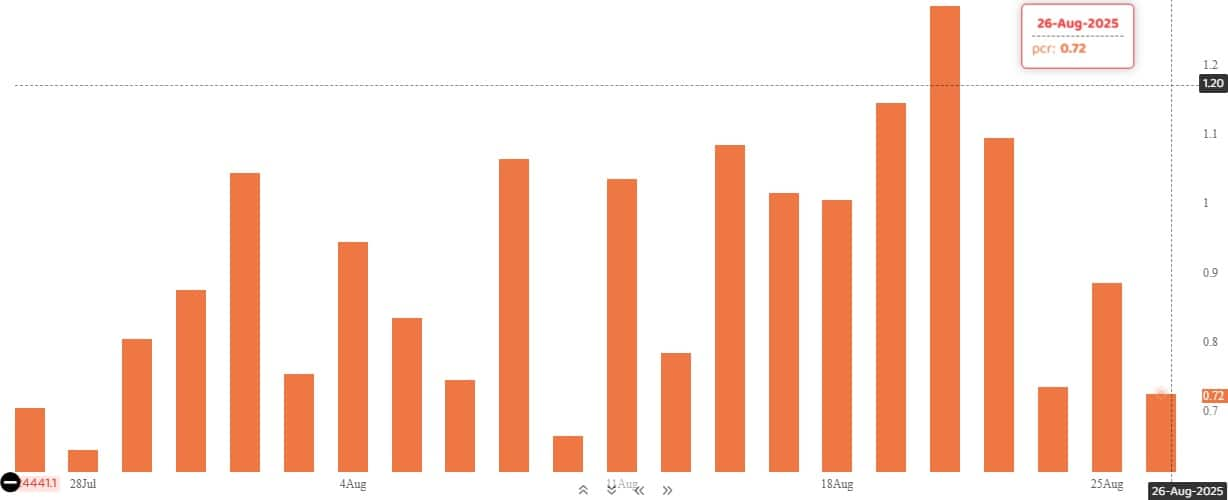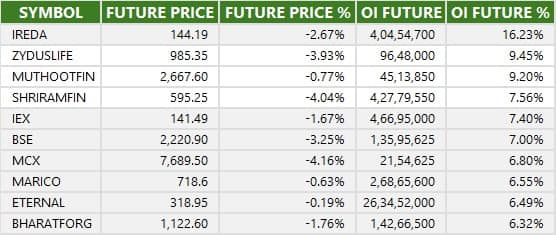



The Nifty 50 succumbed to selling pressure on August 26, falling 1 percent and breaking below short- and medium-term moving averages in a single session with significantly higher volumes. Hence, some more weakness amid volatility can't be ruled out in the upcoming session, i.e., the monthly F&O expiry day. If the index decisively breaks the 100-day EMA (24,635) support, the selling could drag it down toward 24,500 (the 78.6% Fibonacci retracement of the recent rally). However, consistently defending this level could lead to some consolidation, followed by a short-covering rally toward the 24,900–25,000 zone, according to experts.

1) Key Levels For The Nifty 50 (24,712)
Resistance based on pivot points: 24,862, 24,916, and 25,004
Support based on pivot points: 24,686, 24,632, and 24,544
Special Formation: The Nifty 50 formed a long bearish candle on the daily timeframe, falling below the 20- and 50-day EMAs as well as the midline of the Bollinger Bands, signalling weakness. The RSI dropped to 45.92 with a negative crossover, while the MACD maintained a bullish crossover, though it tilted slightly downward. The histogram remained above the zero line. This indicates potential caution, despite some underlying strength.
2) Key Levels For The Bank Nifty (54,450)
Resistance based on pivot points: 54,895, 55,054, and 55,311
Support based on pivot points: 54,381, 54,223, and 53,966
Resistance based on Fibonacci retracement: 55,164, 55,632
Support based on Fibonacci retracement: 53,414, 52,412
Special Formation: The Bank Nifty has decisively broken its upward-sloping support trendline and formed a long red candle on the daily charts with above-average volumes, indicating a negative trend. With Tuesday's fall, the banking index is now trading below the 20-, 50-, and 100-day EMAs. The RSI dropped to 33.43, moving closer to the oversold zone, while the MACD gave a bearish crossover, with the histogram falling below the zero line. This indicates a weakening momentum and possible continued pressure.

According to the monthly options data, the maximum Call open interest was seen at the 25,000 strike (with 1.62 crore contracts). This level can act as a key resistance for the Nifty in the short term. It was followed by the 25,200 strike (1.14 crore contracts), and the 24,800 strike (1.12 crore contracts).
Maximum Call writing was observed at the 24,800 strike, which saw an addition of 96.47 lakh contracts, followed by the 24,900 and 24,750 strikes, which added 57.99 lakh and 51.67 lakh contracts, respectively. The maximum Call unwinding was seen at the 25,400 strike, which shed 37.85 lakh contracts, followed by the 25,350 and 25,450 strikes, which shed 19.18 lakh and 18.95 lakh contracts, respectively.

On the Put side, the 24,000 strike holds the maximum Put open interest (with 94.66 lakh contracts), which can act as a key support level for the Nifty. It was followed by the 24,500 strike (78.39 lakh contracts) and the 24,600 strike (67.48 lakh contracts).
The maximum Put writing was placed at the 24,600 strike, which saw an addition of 14.74 lakh contracts, followed by the 24,700 and 24,100 strikes, which added 8.84 lakh and 4.45 lakh contracts, respectively. The maximum Put unwinding was seen at the 25,000 strike, which shed 77.9 lakh contracts, followed by the 24,900 and 24,950 strikes, which shed 66.87 lakh and 44.65 lakh contracts, respectively.

5) Bank Nifty Call Options Data
According to the monthly options data, the 56,000 strike holds the maximum Call open interest, with 23.21 lakh contracts. This can act as a key resistance level for the index in the short term. It was followed by the 55,500 strike (21.25 lakh contracts) and the 56,500 strike (16.69 lakh contracts).
Maximum Call writing was observed at the 55,000 strike (with the addition of 9.71 lakh contracts), followed by the 54,500 strike (7.22 lakh contracts), and the 54,600 strike (4.62 lakh contracts). The maximum Call unwinding was seen at the 56,000 strike, which shed 3 lakh contracts, followed by the 55,800 and 55,300 strikes, which shed 2.43 lakh contracts, and 2.04 lakh contracts, respectively.

6) Bank Nifty Put Options Data
On the Put side, the maximum Put open interest was placed at the 54,000 strike (with 9.17 lakh contracts), which can act as a key support level for the index. This was followed by the 53,000 strike (7.98 lakh contracts) and the 54,500 strike (7.18 lakh contracts).
The maximum Put writing was observed at the 54,400 strike (which added 1.12 lakh contracts), followed by the 54,600 strike (1.04 lakh contracts) and the 53,300 strike (1.02 lakh contracts). The maximum Put unwinding was seen at the 55,000 strike, which shed 7.04 lakh contracts, followed by the 55,500 and 55,200 strikes, which shed 4.56 lakh and 3.08 lakh contracts, respectively.


The Nifty Put-Call ratio (PCR), which indicates the mood of the market, fell to 0.72 on August 26, compared to 0.88 in the previous session.
The increasing PCR, or being higher than 0.7 or surpassing 1, means traders are selling more Put options than Call options, which generally indicates the firming up of a bullish sentiment in the market. If the ratio falls below 0.7 or moves towards 0.5, then it indicates selling in Calls is higher than selling in Puts, reflecting a bearish mood in the market.

9) India VIX
The India VIX, the fear gauge, climbed to 12.19, up 3.7 percent, and surpassed short-term moving averages, signalling some discomfort for the bulls.

A long build-up was seen in 9 stocks. An increase in open interest (OI) and price indicates a build-up of long positions.

11) Long Unwinding (104 Stocks)
104 stocks saw a decline in open interest (OI) along with a fall in price, indicating long unwinding.

12) Short Build-up (92 Stocks)
92 stocks saw an increase in OI along with a fall in price, indicating a build-up of short positions.

13) Short-Covering (15 Stocks)
15 stocks saw short-covering, meaning a decrease in OI, along with a price increase.

Here are the stocks that saw a high share of delivery trades. A high share of delivery reflects investing (as opposed to trading) interest in a stock.

Securities banned under the F&O segment include companies where derivative contracts cross 95 percent of the market-wide position limit.
Stocks added to F&O ban: Nil
Stocks retained in F&O ban: RBL Bank
Stocks removed from F&O ban: Titagarh Rail Systems
Disclaimer: The views and investment tips expressed by experts on Moneycontrol are their own and not those of the website or its management. Moneycontrol advises users to check with certified experts before taking any investment decisions.Disclosure: Moneycontrol is a part of the Network18 group. Network18 is controlled by Independent Media Trust, of which Reliance Industries is the sole beneficiary.Discover the latest Business News, Sensex, and Nifty updates. Obtain Personal Finance insights, tax queries, and expert opinions on Moneycontrol or download the Moneycontrol App to stay updated!
Find the best of Al News in one place, specially curated for you every weekend.
Stay on top of the latest tech trends and biggest startup news.